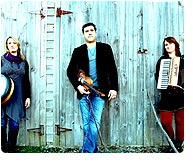|
|
 |
 Vishtèn Brings the Joy of Acadian Roots to the U.S. in March 2012
Vishtèn Brings the Joy of Acadian Roots to the U.S. in March 2012
From childhood evenings listening to music from the top of the stairs, to exuberant folk music sessions on Shetland busses and knockout performances at the Vancouver Olympics, Vishtèn evokes a world in tunes: the rocking boats and waltzing bows of remote island harbors; the unflagging creativity of step dancers and percussive piano, ancient ballads and striking new melodies flowing from vibrant Acadian and Quebecois communities. There, French and Celtic sounds—the same current that flows through Breton, Cajun, Irish, Scottish, and much American music—meet.
This world instantly invites listeners in, with flying footwork, rippling frame drum, soulful fiddle, and songs that are four centuries old, and others newly minted by the band. With members from Prince Edward Island’s legendary Evangeline area—a hub of Acadian culture—and from the most remote reaches of Quebec, the windswept Magdalen Islands, Vishtèn knows how to dance artfully at the rich intersection of deep history and contemporary energy.
The Canadian trio with thousands of performances worldwide under its belt brings its warm, dynamic rendering of French-rooted, Celtic-infused traditions and new compositions to the U.S. for a tour in March 2012. The group’s stops include Chicago, Milwaukee, Minneapolis, Ann Arbor, and Oklahoma City.
“As we’ve looked for songs and compositions, we’ve stepped out of being completely traditional, the way people play at home, while still keeping that influence very present in our minds,” explains musician, singer, and dancer Emmanuelle LeBlanc. “We’re contemporizing our music, and creating our own fresh version of Acadian music.”
This fresh approach shines through the band’s concert recordings (including their latest release, Vishtèn Live) and their upcoming album of all original compositions, Mosaïk. Fans can support the album’s production via pre-sales at www.vishtenmusic.com
{full story below}
Twin sisters Emmanuelle and Pastelle LeBlanc grew up thinking everyone had kitchens full of music, that everyone had house parties where visitors step danced, sang, and fiddled into the wee hours. This was the norm in Evangeline, where Acadian traditions still burst with an irrepressible energy. “We were really surprised when we moved two hours away, and no one did this,” muses Emmanuelle.
Their family grounding in roots music—their father a musician and mother a dancer—helped to nurture the creative spirit that kept the tradition alive. At a step dancing workshop one weekend, the two young performers got a pleasant shock: Their teacher asked them to make something up, to create their own step sequence and share it with the other dancers. “With this teacher, we created music, percussive music,” recalls Emmanuelle. “That opened up something for me. It was out of the whole box of what we had done as step dancers. That translated into music in a way that felt really fun.”
The spirit of innovation fostered a new musical approach to their deep roots. The sisters began making music together inspired by traditional music of the Maritimes and visiting musicians who came to the island. Eventually, they teamed up with veteran fiddler, guitarist, and mandolin player Pascal Miousse, who has toured extensively in a variety of musical genres - from jazz to traditional.
Like the LeBlancs, Miousse was born into a maritime musical tradition, studying from an early age with master local musicians. All three musicians understand the varying feels in the music of Canada’s Franco-Celt regions: the gentle waves rocking the tunes of ocean-faring Magdalen Islanders, that special swing of PEI’s Acadian musicians as they tackled Scottish dances.
Vishtèn mesmerizes their audience with tight three-part harmonies and high-energy foot-stomping percussion. Their live shows capture the freewheeling, upbeat frisson of a kitchen music-making marathon. While bringing fresh and engaging elements into the mix: sprightly piano, ringing bodhrán (traditional Irish drum), and unexpected chord progressions and arrangement twists.
While digging in archives for lost French-language songs, and learning tunes from local song-keepers and field recordings, the trio began to discover and savor the new sprouts leaping from their old roots. Nimble accordion lines insist on bringing the good times—and some subtle nods to psychedelic tape delay—on “Shetland’s Magic Bus,” homage to the group’s best session ever, aboard a musician-packed bus at a festival on the Shetland Islands. “No one wanted to get off the bus!” laughs Pastelle, who composed the tune and rocks the accordion. Otherworldly jaw harp and fiddle overtones shimmer behind elegant, precise vocals and a driving pulse on “La Fougue des Fées.”
“There’s a lot more space and improvisation in our original compositions which helps to showcase our different personalities and influences,” notes Pastelle, “Influences that stretches from bluegrass to Billie Holiday.”
“We can trace many of our ballads back 400 years to France,” explains Emmanuelle, “but much of the music came from the Irish and Scots that settled in Prince Edward Island. Acadians started playing it in their own way, with a different swing, tapping their feet to the music in various ways. And now there’s a further evolution in Acadian music. People are creating their own compositions and young musicians are playing them. It’s really exciting.”
|
|
 |
|
|
|